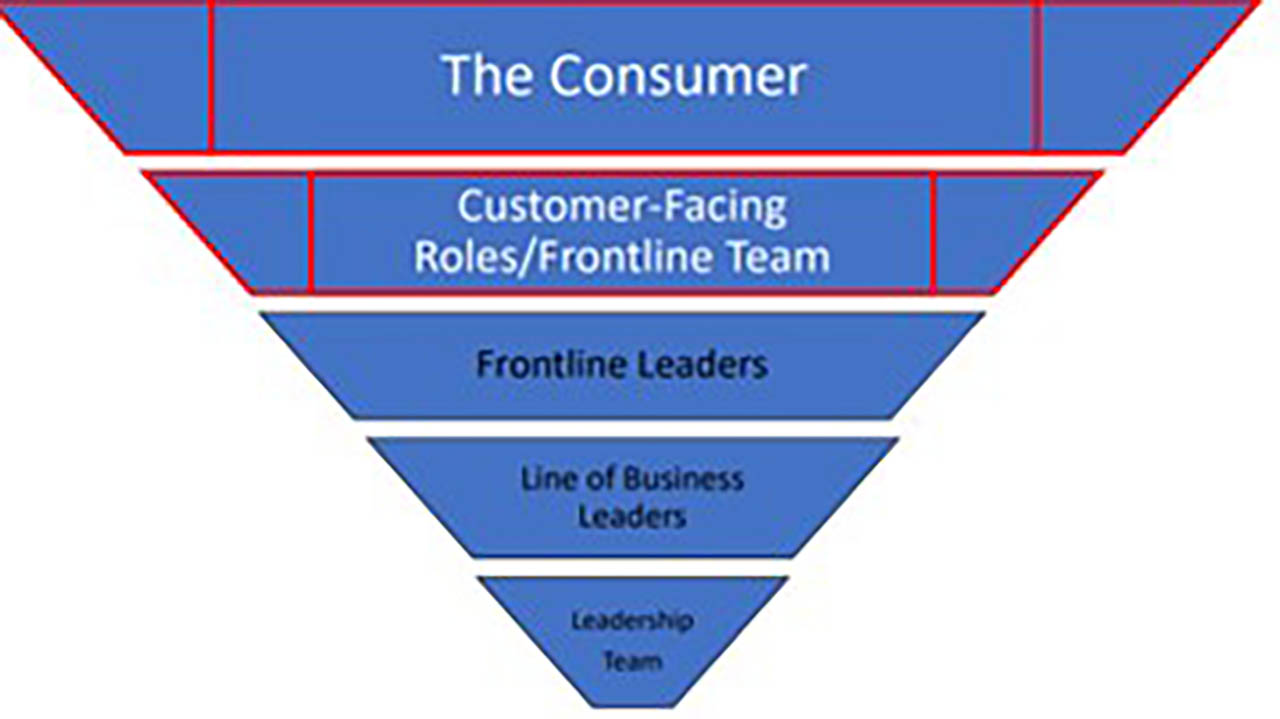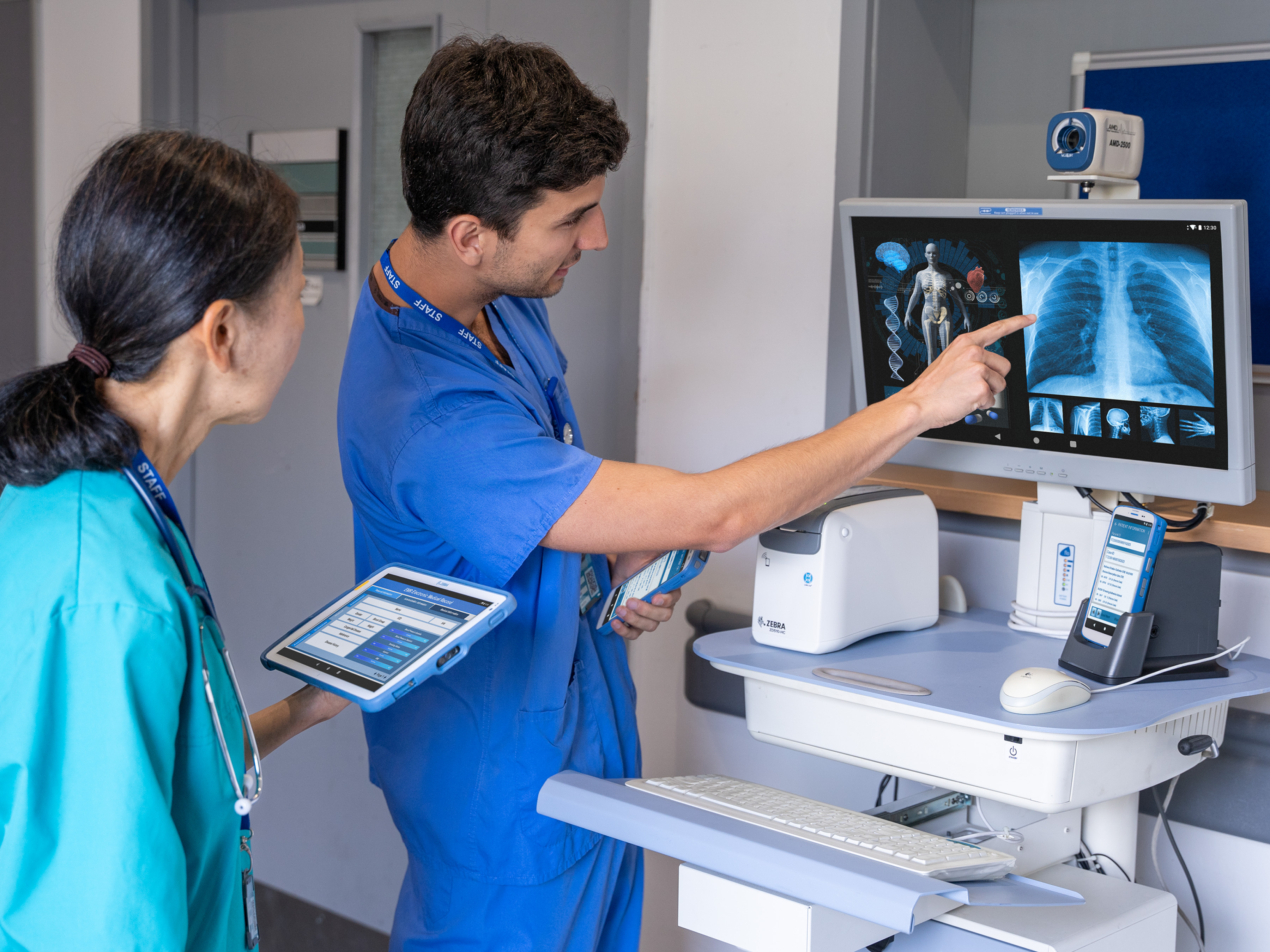Transform retail operations with Zebra’s retail technology solutions, featuring hardware and software for improving inventory management and empowering teams.
Streamline operations with Zebra’s healthcare technology solutions, featuring hardware and software to improve staff collaboration and optimise workflows.
Enhance processes with Zebra’s manufacturing technology solutions, featuring hardware and software for automation, data analysis, and factory connectivity.
Zebra’s transportation and logistics technology solutions feature hardware and software for enhancing route planning, visibility, and automating processes.
Zebra's public sector technology solutions enhance decision-making, streamline operations, and safeguard communities with advanced software and rugged hardware.
Zebra's hospitality technology solutions equip your hotel and restaurant staff to deliver superior customer and guest service through inventory tracking and more.
Zebra's market-leading solutions and products improve customer satisfaction with a lower cost per interaction by keeping service representatives connected with colleagues, customers, management and the tools they use to satisfy customers across the supply chain.
Empower your field workers with purpose-driven mobile technology solutions to help them capture and share critical data in any environment.
Zebra's range of mobile computers equip your workforce with the devices they need from handhelds and tablets to wearables and vehicle-mounted computers.
Zebra's desktop, mobile, industrial, and portable printers for barcode labels, receipts, RFID tags and cards give you smarter ways to track and manage assets.
Zebra's 1D and 2D corded and cordless barcode scanners anticipate any scanning challenge in a variety of environments, whether retail, healthcare, T&L or manufacturing.
Zebra's extensive range of RAIN RFID readers, antennas, and printers give you consistent and accurate tracking.
Choose Zebra's reliable barcode, RFID and card supplies carefully selected to ensure high performance, print quality, durability and readability.
Zebra's rugged tablets and 2-in-1 laptops are thin and lightweight, yet rugged to work wherever you do on familiar and easy-to-use Windows or Android OS.
With Zebra's family of fixed industrial scanners and machine vision technologies, you can tailor your solutions to your environment and applications.
Zebra’s line of kiosks can meet any self-service or digital signage need, from checking prices and stock on an in-aisle store kiosk to fully-featured kiosks that can be deployed on the wall, counter, desktop or floor in a retail store, hotel, airport check-in gate, physician’s office, local government office and more.
Adapt to market shifts, enhance worker productivity and secure long-term growth with AMRs. Deploy, redeploy and optimize autonomous mobile robots with ease.
Discover Zebra’s range of accessories from chargers, communication cables to cases to help you customise your mobile device for optimal efficiency.
Zebra's environmental sensors monitor temperature-sensitive products, offering data insights on environmental conditions across industry applications.
Zebra's location technologies provide real-time tracking for your organisation to better manage and optimise your critical assets and create more efficient workflows.
Enhance frontline operations with Zebra’s AI software solutions, which optimize workflows, streamline processes, and simplify tasks for improved business outcomes.
Empower your frontline with Zebra Companion AI, offering instant, tailored insights and support to streamline operations and enhance productivity.
Boost productivity with Zebra Frontline AI Enablers: AI vision models, sample apps, and APIs streamline workflows for efficient business processes.
Zebra Frontline AI Blueprints deliver adaptable, real-world AI frameworks that automate manual tasks and drive efficiency in high-pressure frontline operations.
Zebra Workcloud, enterprise software solutions boost efficiency, cut costs, improve inventory management, simplify communication and optimize resources.
Keep labour costs low, your talent happy and your organisation compliant. Create an agile operation that can navigate unexpected schedule changes and customer demand to drive sales, satisfy customers and improve your bottom line.
Drive successful enterprise collaboration with prioritized task notifications and improved communication capabilities for easier team collaboration.
Get full visibility of your inventory and automatically pinpoint leaks across all channels.
Reduce uncertainty when you anticipate market volatility. Predict, plan and stay agile to align inventory with shifting demand.
Drive down costs while driving up employee, security, and network performance with software designed to enhance Zebra's wireless infrastructure and mobile solutions.
Explore Zebra’s printer software to integrate, manage and monitor printers easily, maximising IT resources and minimising down time.
Make the most of every stage of your scanning journey from deployment to optimisation. Zebra's barcode scanner software lets you keep devices current and adapt them to your business needs for a stronger ROI across the full lifecycle.
RFID development, demonstration and production software and utilities help you build and manage your RFID deployments more efficiently.
RFID development, demonstration and production software and utilities help you build and manage your RFID deployments more efficiently.
Zebra DNA is the industry’s broadest suite of enterprise software that delivers an ideal experience for all during the entire lifetime of every Zebra device.
Advance your digital transformation and execute your strategic plans with the help of the right location and tracking technology.
Boost warehouse and manufacturing operations with Symmetry, an AMR software for fleet management of Autonomous Mobile Robots and streamlined automation workflows.
The Zebra Aurora suite of machine vision software enables users to solve their track-and-trace, vision inspection and industrial automation needs.
Zebra Aurora Focus brings a new level of simplicity to controlling enterprise-wide manufacturing and logistics automation solutions. With this powerful interface, it’s easy to set up, deploy and run Zebra’s Fixed Industrial Scanners and Machine Vision Smart Cameras, eliminating the need for different tools and reducing training and deployment time.
Aurora Imaging Library™, formerly Matrox Imaging Library, machine-vision software development kit (SDK) has a deep collection of tools for image capture, processing, analysis, annotation, display, and archiving. Code-level customisation starts here.
Aurora Design Assistant™, formerly Matrox Design Assistant, integrated development environment (IDE) is a flowchart-based platform for building machine vision applications, with templates to speed up development and bring solutions online quicker.
Designed for experienced programmers proficient in vision applications, Aurora Vision Library provides the same sophisticated functionality as our Aurora Vision Studio software but presented in programming language.
Aurora Vision Studio, an image processing software for machine & computer vision engineers, allows quick creation, integration & monitoring of powerful OEM vision applications.
Adding innovative tech is critical to your success, but it can be complex and disruptive. Professional Services help you accelerate adoption, and maximise productivity without affecting your workflows, business processes and finances.
Zebra's Managed Service delivers worry-free device management to ensure ultimate uptime for your Zebra Mobile Computers and Printers via dedicated experts.
Find ways you can contact Zebra Technologies’ Support, including Email and Chat, ask a technical question or initiate a Repair Request.
Zebra's Circular Economy Program helps you manage today’s challenges and plan for tomorrow with smart solutions that are good for your budget and the environment.

Empowering the Frontline: Inside Grupo Bimbo’s AI-Powered Transformation in Its Bakeries and the Stores It Stocks
One of the things I’m especially proud of since the beginning of antuit.ai is the number of customers who have been eager to come forward and share their positive experiences with us. Like any successful business, the most genuine form of advertising is an enthusiastic word-of-mouth endorsement—particularly in front of a live audience at a high-profile industry conference.
Earlier this year at the Gartner Supply Chain Symposium, I was very pleased to share the stage, before an auditorium of 200 attendees, with Morgan Smith, Vice President of Direct Store Delivery (DSD) Center of Excellence for one of our major CPG customers, Bimbo Bakeries USA.
For those unfamiliar with the name itself, Grupo Bimbo is the world’s largest baked goods company, spanning over 100 brands across 33 countries. In the U.S. alone, Bimbo Bakeries USA produces over 20 distinct bakery brands, from iconic names like Sara Lee, Entenmann’s, and Thomas’ English Muffins to a variety of popular niche or regional brands. Much of what we see in the grocery bread aisle is a testament to Bimbo’s quality standards and efficient DSD logistics.
But as company leaders like Morgan will tell you, success isn’t something that comes easy. In fact, most successes in life are born out of struggle – a tipping point at which we’re forced to really think through the best way forward. In business, that struggle may be stagnation. Other times it’s competition, resource constraints or fluid consumer expectations. For Grupo Bimbo, and the Bimbo Bakeries USA team specifically, it was a knowledge gap between senior leaders and front-line workers, especially as it related to demand forecasting, store delivery and related operations.
Morgan wanted to find a way to close that gap using technology. More specifically, he wanted to find technology that could translate all of Bimbo’s operational and market data into a consistent and satisfactory consumer experience. So, he started thinking about things a lot differently than most people did at that time – and most people still do today.
The Challenge: “Let’s Be What We’re Not”
For our Gartner audience, Morgan first recalled how, six years ago, after already overseeing Bimbo’s U.S. operations for around two decades, he was tapped to lay the groundwork for an organizational transformation:
How could a company that in effect functioned as a dozen fragmented regional bakeries be centralized into a world-class enterprise?
How could scaling business volume be led out of a virtual “Stone Age”—desktop calculators and manual spreadsheets—toward advanced, data-driven technologies?
How could the company’s mission be reshaped around the consumer experience? In particular, the budget-conscious shopper who expects the last two slices of their weekly loaf of bread to be as fresh and tasty as the first.
What tools could be internally developed to empower the company’s front-line workforce—maintaining the highest quality from the production line through final store delivery?
Morgan visually represented Bimbo’s new priorities as an “inverted pyramid”, where the most important stakeholders were everyday consumers, followed closely by the company’s front-line teams that directly serve them:

To find the answers to these questions, Morgan had to visit Bimbo plants across the country, engaging those with decades of expertise to learn what’s working and what’s not—from veteran bakers on the production line to front-line workers such as DSD drivers who are the last to handle products before the final sale. Morgan described these consumer-facing roles—numbering in the thousands nationwide—as Bimbo’s “army of vision carriers,” as well as “the last line of defense” for ensuring a terrific brand experience for the consumer.
Applied to Bimbo’s broader transformation, Morgan noted that this was a marked departure from the “command and control” mindset of other companies. Instead of having operations-related information and instructions flow from top leadership downward to front-line teams, Morgan wanted to find technologies that would help those on the front lines better communicate and coordinate with each other first and foremost, before eventually flowing status reports and real-world insights “downward” to senior management to keep them apprised of issues and opportunities.
Augmenting Human Know-How with AI
After months of soliciting direct input from bakers and delivery people across the company, Morgan explained how they ended up collaborating with the antuit.ai team at Zebra to develop and launch a proprietary demand intelligence platform, which they named “Ion.”
The technical “engine” behind Ion is antuit.ai’s AI-powered demand forecasting and predictive ordering technology, which the Bimbo and antuit.ai teams collaboratively tailored to support different front-line workers via custom user interfaces (UIs). Everyone from operations managers to DSD drivers can now open their respective UI to right-size production and localized delivery plans down to a SKU/store/week level factoring seasonality, local events, promotions, and other outside influences that may not be considered with human-led demand forecasting and inventory planning models.
When I asked Morgan to evaluate the quality of our AI data modeling, he offered perhaps the most succinct answer we’ve ever heard: “Nine times out of ten, it knows what my wife wants to buy on a Tuesday with a coupon in her pocket and she’s hungry. That’s unbelievable accuracy.”
In fact, it was the predictive accuracy of this particular AI platform that drove Morgan and his team to call antuit.ai in the first place. There are many different ways to improve demand forecasting, inventory planning and the efficiency of operational execution. However, many—too many, perhaps—are disadvantaged by people’s inability to see and process everything happening in the world around them. We can’t aggregate data, much less detect patterns, at the scale or speed of machine learning algorithms or adaptive AI, no matter how hard we try. So, business leaders who want to be well-positioned to respond to market volatility, and those who want to be confident in the daily decisions their teams are making in response to even slight changes to consumer behaviors, are finding that they must investigate AI’s capabilities. They need to be able to assess current market demand and business capacity alongside recent performance and future efficiency opportunities almost simultaneously, every day, and then flow those insights in a highly tailored manner to each person in their organization calling the shots on how to execute that day. That is no easy feat, and it has proven impossible for humans to accomplish on their own.
Fortunately, Morgan—and all 20,000+ Bimbo employees—now have clear guidance on what they must do to deliver the right quantity of fresh goods to the right place at the right time. They don’t have to waste time guessing if they’re making enough product for the day or mapping the right delivery route based on current inventory levels and demand, and the predictive accuracy of Ion means they don’t end up with wasted products on store shelves due to overestimated demand and overstocks.
The COVID Crucible
The real test for Ion would come at the outset of the pandemic when grocery demand patterns changed instantly. While so many CPG companies—and competing bakery companies—struggled with supply chains and logistics for months on end, the Bimbo team was able to adapt its forecasting and production far more quickly. They were able to meet the heightened demand for their baked goods as more consumers started to eat at home amid restaurant closures. In less than a month, they were able to right-size their production volumes, adjust delivery routes to avoid out-of-stocks, and properly staff production lines, loading docks and trucks to meet the skyrocketing demand.
You can read all about the specific changes they made across their operations and why here:
How Bimbo Bakeries USA Improved Order Accuracy, Reduced Waste
No Easy Journey, But Worth the Payoff
Now that things are stabilizing a bit, Morgan and his team have had time to really assess the impact of his decision to lean on AI for DSD predictive ordering. How did this one change help maintain the balance between product freshness and product availability, simplify collaboration between planners and route operators, and scale operations to support Bimbo’s more than 11,000 U.S. distribution routes? And did this one software investment really deliver the “Perfect Order” solution the Bimbo Bakeries USA team was collectively looking for?
As you’ll see when you dig in more to Bimbo’s story, this adaptive AI tool has absolutely reduced forecast errors that used to result in overstocking and understocking – by up to 30% no less! It has also helped the team maintain a forecast efficiency rating of over 80% for more than five years, including through the pandemic. And Morgan says over 20,000 employees, from bakers to DSD drivers, have found it easier to deliver exactly what baked goods consumers want—fresh goods every day—thanks to the more accurate guidance provided by the AI tool’s predictive capabilities.
Before we wrapped up the Gartner session, I asked Morgan what advice he’d give other business leaders before embarking on a similar data/IT journey for their organizations. He responded by giving everyone a heads up that changing how you plan and execute operations on this scale is invariably a huge undertaking—something that must happen over the course of years rather than months. However, he stressed that if you begin the journey by defining the right leadership model, then choosing the right data technology partner and strategic advisor to help bring your ambitions to life in a tangible and measurable way, then you’ll gain a very real strategic advantage that competitors won’t be able to match, especially if they’re not yet leveraging adaptive AI to help them adapt their production and delivery operations to align with current (i.e., changing daily) demands.
###
Related Read:
Bimbo Bakeries USA Minimizes Waste by Improving Its Forecasts by 30% with Zebra Technologies
Zebra Developer Blog
Zebra Developer BlogZebra Developer Blog
Are you a Zebra Developer? Find more technical discussions on our Developer Portal blog.
Zebra Story Hub
Zebra Story HubZebra Story Hub
Looking for more expert insights? Visit the Zebra Story Hub for more interviews, news, and industry trend analysis.
Search the Blog
Search the BlogSearch the Blog
Use the below link to search all of our blog posts.
Most Recent
Legal Terms of Use Privacy Policy Supply Chain Transparency
ZEBRA and the stylized Zebra head are trademarks of Zebra Technologies Corp., registered in many jurisdictions worldwide. All other trademarks are the property of their respective owners. Note: Some content or images on zebra.com may have been generated in whole or in part by AI. ©2026 Zebra Technologies Corp. and/or its affiliates.




